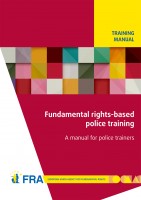Vist 161 gange.

| Titel | Fundamental rights-based police training: A manual for police trainers |
| Udgivet af | FRA – European Union Agency for Fundamental Rights |
| Udgivet | 3. december 2013 på the International Conference on Human Rights Education and Training for the Civil and Public Service i Dublin, Irland |
| Sprog | Engelsk |
| Antal sider | 203 |
| ISBN-13 | 978-92-9239-230-7 |
Politiets uddannelse er det f√łrste og vigtigste skridt i retning af at skabe et mere effektivt og professionelt politi i fremtiden.
Menneskerettigheder – baseret p√• uddannelse hj√¶lper deltagerne til proaktivt at respektere og beskytte de grundl√¶ggende rettigheder. Det sikrer, at anvendelsen af magt ud√łves i overensstemmelse med principperne om legalitet, n√łdvendighed og proportionalitet – principper, der er grundl√¶ggende for udvikling af et samfund. En s√•dan uddannelse vil derfor g√łre det muligt for politifolk at opfylde den rolle, som er planlagt for dem i Den Europ√¶iske Unions k√łreplan for arbejdet p√• omr√•det retf√¶rdighed, frihed og sikkerhed.
Denne uddannelsesmanual har til form√•l at bidrage til at fremme tillidsforholdet mellem politiet og samfundet som helhed og i al dets mangfoldighed, og fokuserer derfor p√• retten til ikke-diskrimination, v√¶rdighed og liv. En r√¶kke unders√łgelser og projekter i Den Europ√¶iske Unions Agentur for Grundl√¶ggende Rettigheder (FRA) har understreget sammenh√¶ngen mellem tillid til myndighederne og ud√łvelse af de grundl√¶ggende rettigheder.
Hvor tillid eksisterer, vil anmeldelse af kriminalitet stige; flere forbrydelser vil derfor blive behandlet og yde retf√¶rdighed til ofrene. Ved at sikre alle borgeres grundl√¶ggende rettigheder, vil politiet skabe tillid i hele samfundet, hvilket bidrager til en god cirkel, der vil tilskynde til anmeldelse af kriminalitet, bidrage til en mere effektiv kriminalitetsbek√¶mpelse, √łge retf√¶rdighed for ofrene og mindske sp√¶ndinger i samfundet.
FRA-udviklede grundrettigheder – baseret p√• politiets uddannelses manual i t√¶t samarbejde med Association of European Police Colleges, the European Police College og deres netv√¶rk af nationale politiskoler hj√¶lper med at opbygge en s√•dan tillid og fremme etableringen af f√¶lles standarder for politiarbejde, som respekterer principperne i grundl√¶ggende rettigheder. Vores hensigt er at √łge politiets professionalisme og effektivitet i hele EU ved at give politiets undervisere et praktisk og let tilg√¶ngeligt v√¶rkt√łj, der hj√¶lper med at integrere grundl√¶ggende rettigheder i politiets uddannelse.
Ovenn√¶vnte er en overs√¶ttelse af forordet til manualen skrevet af direkt√łren for FRA – European Union Agency for Fundamental Rights, Morten Kj√¶rum.
Der tages forbehold for oversættelsens rigtighed. Ved brug som dokumentation henvises til den originale tekst.
Herunder gengives manualens indholdsfortegnelse. Den er ikke oversat, da hele manualen er på engelsk.
Tina. Thranesen.
Indholdsfortegnelsen
| FOREWORD | 3 | ||
| INTRODUCTION | 9 | ||
| HOW TO USE THE MANUAL | 13 | ||
| MODULE 1: BASICS OF HUMAN RIGHTS00 | |||
| Introduction | 23 | ||
| Activity: Understanding the basics of human rights | 24 | ||
| Handout – Basic ideas and concepts of human rights | 26 | ||
| Briefing notes | 27 | ||
| 1. | What are human rights? | 27 | |
| 2. | What types of human rights are there? | 28 | |
| 3. | What do human rights do? | 29 | |
| 4. | What obligations exist under human rights? | 30 | |
| 5. | Where are human rights embodied in law and how are they monitored? | 32 | |
| Supplementary material | 35 | ||
| MODULE 2: POLICING FROM A HUMAN RIGHTS PERSPECTIVE | |||
| Introduction | 45 | ||
| Activity: Policing from a human rights perspective | 46 | ||
| Handout 1 – Discussing police and human rights | 49 | ||
| Handout 2 – Practical human rights examples | 50 | ||
| Briefing notes | 51 | ||
| 1. | Key concepts | 51 | |
| 2. | Handouts – Questions and answers | 51 | |
| a. | Handout 1 – Questions and answers | 52 | |
| b. | Handout 2 – Questions and answers | 57 | |
| Supplementary material | 59 | ||
| Extended activities | 63 | ||
| Extended activity 1: One-on-one interviews in Sweden’s police academy |
63 | ||
| Extended activity 2: Human rights education for German police officers at historical sites of Nazi crimes. Police work today and in the past |
65 | ||
| MODULE 3: HUMAN RIGHTS ANALYSIS – THE OBLIGATIONS TO RESPECT AND TO PROTECT Introduction |
69 | ||
| Activity: Human rights analysis – obligations to respect and to protect |
70 | ||
| Handout 1 – Human rights analysis – obligation to respect | 72 | ||
| Handout 2 – Human rights analysis – obligation to protect | 75 | ||
| Briefing notes | 78 | ||
| 1. | Key concepts | 78 | |
| a. | What is a human rights obligation? | 78 | |
| b. | What do we mean by necessity and proportionality in human rights? | 78 | |
| 2. | Activity guide: human rights analysis | 80 | |
| a. | Handout 1 – obligation to respect | 83 | |
| b. | Handout 2 – obligation to protect | 90 | |
| Supplementary material | 95 | ||
| Extended activities | 104 | ||
| Extended activity 1: Scenario training at Austria’s police academies |
104 | ||
| Extended activity 2: Scenario training at Germany’s State Police of North Rhine-Westphalia |
106 | ||
| MODULE 4: THE PROHIBITION OF TORTURE AND INHUMAN OR DEGRADING TREATMENT OR PUNISHMENT |
|||
| Introduction | 111 | ||
| Activity – Version 1: Conditions that facilitate or prevent ill-treatment |
112 | ||
| Activity – Version 2: Ill-treatment role play and case studies | 112 | ||
| Handout – Activity version 1: Conditions that facilitate or prevent ill-treatment | 115 | ||
| Handout – Activity version 2: Ill-treatment role play and Case studies A and B | 117 | ||
| Briefing notes | 119 | ||
| 1. | Key concepts | 119 | |
| 2. | What is inhuman or degrading treatment? | 120 | |
| 3. | Activity version 1 – Conditions that facilitate or prevent ill-treatment |
121 | |
| a. | Milgram experiment | 121 | |
| b. | Stanford prison experiment | 122 | |
| 4. | Activity version 2 – Ill-treatment role play and Case studies A and B | 123 | |
| Supplementary material | 125 | ||
| MODULE 5: DIVERSITY, EQUALITY AND NON-DISCRIMINATION | |||
| Introduction | 133 | ||
| Activity 1 – Version 1: Left hand/right hand | 134 | ||
| Activity 1 – Version 2: Multiple identities | 137 | ||
| Handout – Activity 1 version 2: Multiple identities | 139 | ||
| Activity 2: Role play – job applications | 140 | ||
| Handout – Activity 2: Role play – job applications | 143 | ||
| Activity 3: Human rights analysis – non-discrimination | 144 | ||
| Handout – Activity 3: Human rights analysis – non-discri mi nation |
146 | ||
| Briefing notes | 149 | ||
| 1. | Key concepts | 149 | |
| a. | Diversity and identity | 149 | |
| b. | Equality and non-discrimination: basic concepts | 151 | |
| c. | Discrimination and profiling | 155 | |
| 2. | Analytical scheme – non-discrimination | 156 | |
| Handout – Activity 3: Human rights analysis – non-discrimination | 158 | ||
| Supplementary material | 163 | ||
| MODULE 6: HUMAN RIGHTS OF POLICE OFFICERS | |||
| Introduction | 171 | ||
| Activity 1: Human rights experiences | 172 | ||
| Activity 2: Case study – discrimination in the workplace | 174 | ||
| Handout – Activity 2: Case study – discrimination in the workplace | 176 | ||
| Briefing notes | 178 | ||
| 1. | Key concepts | 178 | |
| a. | Do police officers have human rights? | 178 | |
| b. | Challenges to the human rights of police officers | 180 | |
| c. | Which human rights are particularly relevant to police officers? | 181 | |
| 2. | Activity guide: human rights analysis | 183 | |
| ANNEXES | |||
| Annex 1: Workshop programmes | 189 | ||
| Annex 2: Basic guidance for trainers | 194 | ||
| Annex 3: Case study preparation – tips | 197 | ||
| Annex 4: Compilation of practices | 201 | ||
Manualen i pdf-format hos FRA – European Union Agency for Fundamental Rights.
Omtale af manualen hos FRA – European Union Agency for Fundamental Rights.
